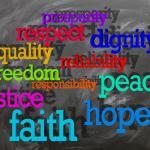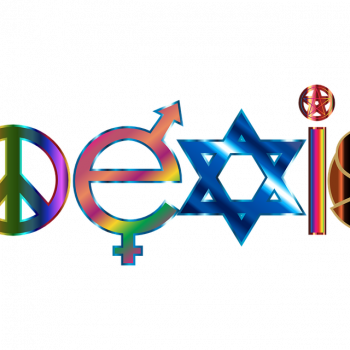 Contrary to the popular belief, the purpose of Interfaith Iftars and any other form of Interfaith dialogue is not to convert each other. Muslims in the United States are increasingly opening their mosques and Islamic centers to people of other faiths during the month of Ramadan to break their fast (Iftar) together at sunset. The underlying theme is to promote Interfaith understanding and harmony, ultimately leading to peace between people of various faiths.
Contrary to the popular belief, the purpose of Interfaith Iftars and any other form of Interfaith dialogue is not to convert each other. Muslims in the United States are increasingly opening their mosques and Islamic centers to people of other faiths during the month of Ramadan to break their fast (Iftar) together at sunset. The underlying theme is to promote Interfaith understanding and harmony, ultimately leading to peace between people of various faiths.
Breaking bread together is an age-old tradition and a great way to bring people together. These Iftar programs are being held with increasing frequency at other places of worship such as Churches and Synagogues. I have been fortunate to be part of many of these programs and can tell you first-hand that these events go a long way towards promoting understanding and harmony in the community.
These programs often jump start interfaith dialogue between Muslims, Jews and Christians- the three faiths typically represented at these events, though there are representations from other faiths such as Hindus, Sikhs, as well as agnostics. One overarching theme,, as spelled out in the Qur’an, is to simply get to know each other.
O mankind! Behold! We have created you from a male and female, and have made you (into) nations and tribes (so) that you may know each another. (not that ye may despise each other).Verily the noblest of you, in the sight of Allah, is the best in conduct (most conscious of God). Verily, God is all-knowing, all-aware. 49:13
The differences and the tensions that currently exist between Jews, Christians, and Muslims are nothing new; they have existed for centuries. The Qur’an acknowledges that and provides broad guidelines and instructs its followers on how to approach interfaith dialogue:
Do not argue with the People of the Book except in the best manner—except for those wicked amongst them, and say: ‘We acknowledge what was revealed to us and in what was revealed to you; Our God and your God is the same. To him we peacefully submit.’ 29:46
 I draw at least two lessons from this verse. Firstly, when we interact, we need to do this in the best manner and civility- a key principle of any interfaith dialogue. Secondly, rather than trying to convince the other as to who is right or wrong, the Qur’an emphasizes on drawing similarities. (‘We acknowledge what was revealed to us and in what was revealed to you; Our God and your God is the same. To him we peacefully submit.’).
I draw at least two lessons from this verse. Firstly, when we interact, we need to do this in the best manner and civility- a key principle of any interfaith dialogue. Secondly, rather than trying to convince the other as to who is right or wrong, the Qur’an emphasizes on drawing similarities. (‘We acknowledge what was revealed to us and in what was revealed to you; Our God and your God is the same. To him we peacefully submit.’).
This is not the only time the Qur’an asks the believers to cherish the commonalities.
Say: O People of the Book! come to common terms as between us and you: That we worship none but God; that we associate no partners with him; that we take not, from among ourselves, Lords and patrons other than God. 3:64
And behaving in the best manner is not limited to the ‘People of the Book’. This is applicable to anyone and everyone.
Call to the way of your Lord with wisdom and goodly exhortation, and have disputations with them in the best manner. 16:125
Following passage reminds us that God had sent his message and a set of laws to all nations and exhorts us to ‘race’ with each other in good deeds.
…To each among you have we prescribed a law and an open way. If Allah had so willed, He would have made you a single community, but (His plan is) to test you in what He has given you: Vie, then, with one another in doing good works! Unto God you all must return. It is He that will show you the truth of the matters in which you dispute. 5:48
Putting these passages together, we can draw several lessons and guiding principles for interfaith dialogue:
- When we argue or have a dialogue, we need to do it in the most civil manner.
- The underlying purpose of this dialogue is to get to know each other, and NOT to prove who is right or wrong. God is the only judge and He will tell us the truth, so we should abstain from judging ourselves.
- Draw commonalities- common belief and practices (while not completely ignoring the differences- but that would come later when we have established a trusting relationship).
- Vie with one another in good deeds. Though it is not spelled out in the passages cited above, the Scriptures are clear about what these virtuous deeds are that we all agree upon: helping the poor, the needy, the hungry, the homeless in our communities and striving for social justice and equality.












